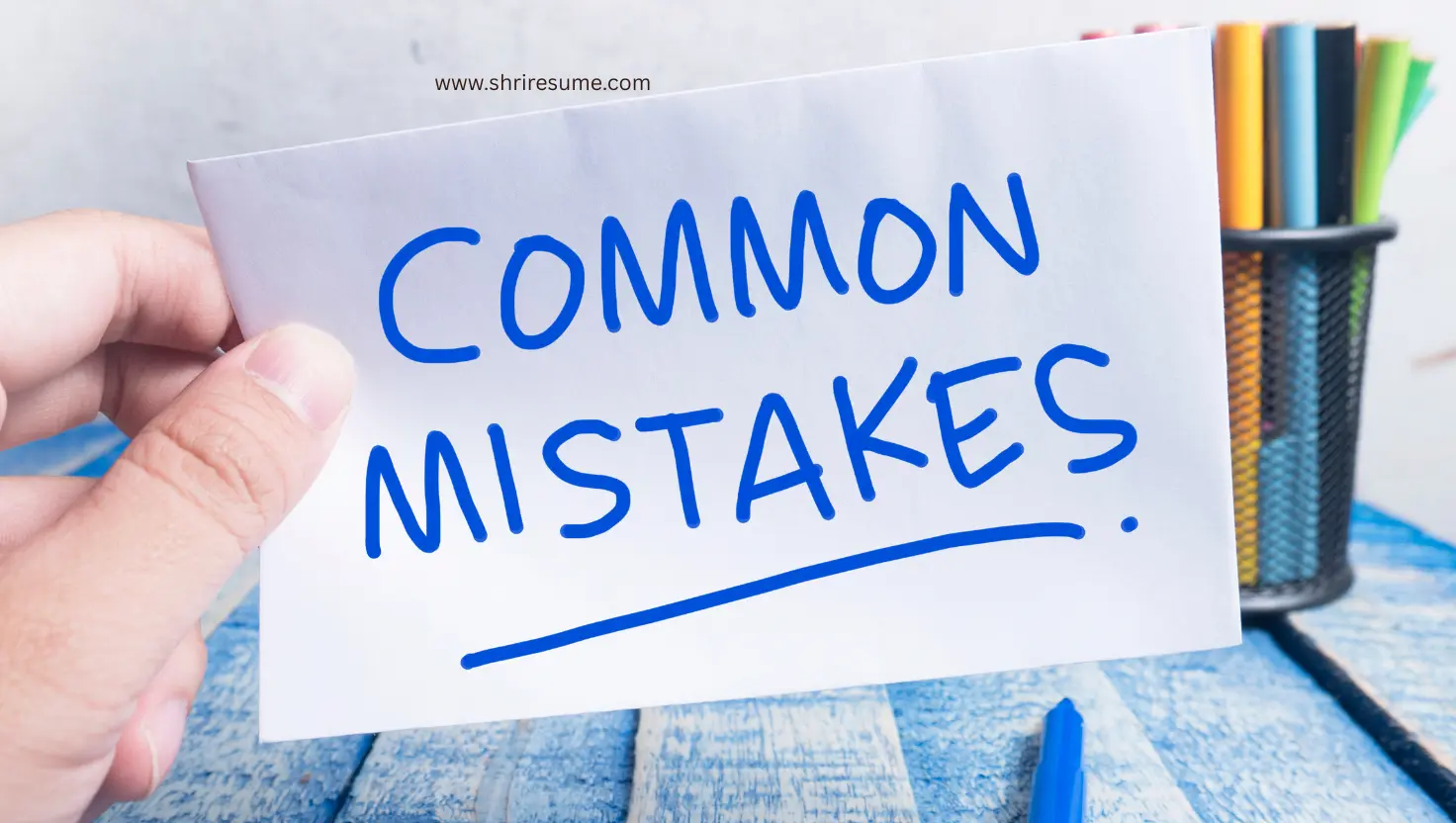Most Common Cover Letter Mistakes
So, you are ready to apply for your dream job with your customized resume . Hopefully, you have already made all efforts to build a customized resume as per the job you are applying for. But wait, are you still missing something? A cover letter probably – or you think it is not that important and has become a thing of the past!
If so, let us tell you that while many recruiters today don’t bother about cover letters , a decent number of hiring managers are still out there, who consider cover letters to be as important as a resume. A recent report depicts that more than 50% of hiring professionals prefer candidates who attach a cover letter while applying. And, you don’t know which kind of hiring manager will be receiving your job application. Hence, there is no point in taking a chance.
The facts above also suggest how important it is to tweak a cover letter every time you apply for a different job with a fresh or customized resume – remember that your cover letter is a reflection of your resume, and hence should be prepared accordingly.
Like a resume, you bend over backward to create an imposing cover letter , at times, you inadvertently make some common mistakes in your cover letter. Usually, this happens because you tend to be in a hurry while applying for a job and so, forget to give requisite attention to your cover letter, even if you are attaching one.
At times, mistakes are made on cover letters due to a lack of proper guidance. Remember that such mistakes in your cover letter may lead to immediate rejection. This is because you are not alone in applying to your dream job and many of your competitors might be interested in creating an exceptional cover letter to leave a great first impression on the recruiter!
Thus, to keep you aware of and help you avoid such slip-ups, here is a list of the most common cover letter mistakes that you should completely avoid.
Lack of Proper Research
All thanks to the internet, it is now very easy to research the role and company while making or personalizing a cover letter. You should search for the name of the recruiter or hiring manager if you don’t find the same on the job post. Also, look for details about the company you are applying to. This information should be used to customize the opening lines of a cover letter.
Skipping any such information will simply reflect the reader that you are not enthusiastic enough to explore additional information on the job opportunity and the corresponding company. In today’s competitive world, where hiring professionals get an overwhelming response to a job post, any minor mistake is enough to cause them to reject your application.
So, never allow them to discard your cover letter, especially when you find yourself a great fit for the job concerning your skills, qualification, and experience.
However, there are a few exceptions to this. If the job posting is anonymous, there is no need to include the recruiter’s and company’s names in the cover letter. If a company deliberately wants to hide its name or the name of its hiring professionals, be rest assured that the recruiter is not going to deduct any point for a cover letter with generic opening lines.
Excessively Casual or Formal Greeting
It is all-important to take into account the culture of the company for whatever you do as an applicant for your dream job – be it about crafting a cover letter and resume or preparing for common interview questions. To have a better idea of the company’s philosophy, you can browse the career page on its website, read its reviews on some reputed websites and recruitment-specific pages of the company on social media.
Either in person or on LinkedIn, you can also consider talking to professionals, who are working or have worked at your dream organization. This will let you know exactly which greeting style will be just right to greet the recruiter. In case there is no scope for addressing the letter to someone, never use utterly formal statements, such as ‘To Whom It May Concern’, as these are not conversational and can be unappealing.
Similarly, you should steer clear of uber-casual greetings like “Hi.” Even when you are applying to a start-up organization, which boasts an unconventional culture, such a greeting might be too casual as your very first communication with the company and can raise questions about your professionalism.
Beginning with Your Name
Remember, unless you are an A-lister, your name is not the most important thing, to begin with on your cover letter. Needless to say, your name is supposedly already there on your resume, the sign-off section of your cover letter, and in several other sections of your job application.
Instead, start with your recent qualification if you are a fresher. Seasoned professionals should ideally begin by stating their work experience in their respective domains.
Completely Focusing on Yourself

Remember that your cover letter is the marketing copy that you will use to pitch to the hiring manager. Rather than just discussing yourself and your wants and expectations on the cover letter, think about your potential employer. This is because your future boss will probably read your cover letter before considering you for an interview.
Go back to the job description (JD) and read it again. Also, explore the latest news about the company. Question yourself what purpose the company will fulfill with this hiring. Simply put, try finding the pain points that the company will be able to get rid of by filling this job position.
You can simply up your chances of grabbing a recruiter’s attention with your cover letter if you could be able to understand his concern and show how your skills can be a solution to his needs.
Making It a Copy of Your Resume
While creating a cover letter, do bear in mind that the recruiter has your resume too. There is no point in repeating your complete work history on the cover letter. A possible reason behind why many recruiters today don’t care about cover letters could be their unpleasant experiences of going through really bad ones in their past.
Remember, a cover letter is just a summary of your resume with a personal touch, and not a space to rewrite your resume. An excellent cover letter writing tip is to amaze the recruiter by showing your understanding of the company’s needs and position in its target market, and also how your skills and achievements are in line with the requirements.

Keeping it General
No matter whether you are applying to some anonymous job post, using cliched text is a major cover letter mistake under all circumstances. For anonymous job posts, your introduction might not be as specific as it should be for the one, where an employer or recruiter is known, but this fact doesn’t give you the liberty to make use of boilerplates for major sections of your cover letter.
Depending on the JD, list 4-5 main job requirements. These could be related to your knowledge of a specific industry or role, your past work experience of performing certain tasks, your qualification, or even accomplishments.
Now, think about how you fulfill all those prerequisites given your contributions, achievements, or experience during your present and past roles. Once you figure out this, summarize the content in a small paragraph or bullet points preferably. This is a great way to customize the cover letter to catch the eyes of hiring managers.
Not Caring about Instructions
As mentioned above, many recruiters – particularly those who work in the health, legal, and education sectors – still give value to cover letters and can be seen requesting the same in their job posts. So, you should always read the JD thoroughly to identify what exactly to include as well as to avoid in your cover letter.
Many times, employers specifically ask to include certain detail in a cover letter. And if you are turning a blind eye to such information, it will leave an impression on recruiters that you are not serious about the job opening and your inability to follow such simple instructions.
Typos
Just to remind you again, you always compete against several applicants when you apply for your dream job. This means a single mistake on the cover letter can lead to rejection. These days, we hugely bank on spell-check and autocorrect tools, so chances are there that we might fail to notice seemingly trivial errors, such as having autocorrected term “word” when you want to type “work” or “part” instead of “past.” Thus, do not make any such errors that may cause the recruiter to remove your cover letter from that huge pile.
Re-reading it, once done, is the best way to ensure an error-free cover letter. If possible, take the third reading. Then, ask your trustworthy friend or closed one to read it for you. Necessarily, he/she shouldn’t be a job expert, but someone who has a great command of written language. You can also consider reading some great grammar and writing style resources/books, not only to avoid common cover letter mistakes but also to craft an impressive resume.
Making It Lengthy
When in general, recruiters spend six seconds to ten going through a single resume, how much time do you think they give to cover letters? I hope, you now have the answer. So, taking note of it here is another wonderful cover letter tip: It should be no longer than what is just required, and should not go beyond a single page.
Readability is important too (just like a resume); so, use simple fonts and create white space in your cover letter.
Going Off-Track
Whether you are on a job hunt expedition or planning your career progression, it is crucial to take heed of how you present yourself as a professional – be it in the online space, over the paper, or in person. Thus, it is important to make your cover letter just in line with your resume. In simple words, it should be a true reflection of your resume.

When uploading a cover letter separately to apply for a job, keep the header similar to that of your resume. Plus, check if the font size, color, and type along with your name, contact information, and so forth remain the same in both documents.
Stuffing Too Much Information
There is nothing bad about explaining your desire to relocate for work or an employment gap , but don’t go overboard with all such information. No recruiter is interested in explicitly getting into the details of your medical condition or learning about those aspects of your life that you don’t prefer sharing just with anyone out there.
Such irrelevant information can’t be used as a selling pitch and will only devalue your skills, qualification, and achievements
Takeaway
In addition to following tips to create an impressive cover letter, avoiding the mistakes mentioned above will help you create a flawless cover letter, which is free of errors or anything else that might zap your chances of being shortlisted for the job interview.

Get a higher quality resume format
Our Resume Builder ensures best practices, logic, formatting standards and job matching opportunities from thousands of job boards and portals around the world.
By clicking Start Your Resume, Your are agree to our Terms of use and Privacy Policy
 India's
premier resume service
India's
premier resume service






